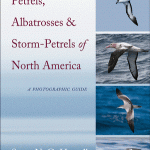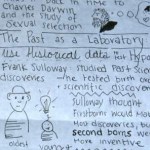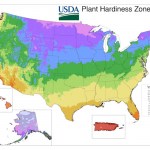
If you are a snake. And, what causes some island dwelling boas to be smaller than the mainland variety?
If you want to know the answer to these two burning questions, click here and visit Smithsonian's Surprising Science where I'll be guest blogging for a couple of weeks. For the first question, there is some new and very cool research. For the second question, some older (but closely related) research.
I suspect that the complexity of global climate change is under-appreciated. If you live in a cold climate and I tell you that things will get warmer, you may see this as good news and look forward to a future where you no longer have to get your antifreeze checked and replace your old battery in September in preparation for the bitter cold of winter. But global warming is not the only kind of change happening because of the release of huge amounts of carbon in the atmosphere, and even with respect to the warming itself, things are much more complex than "it gets warm." One example of this…
Since the Daily Mail is a British thing and the latest form of entertainment in Britain is Libel Tourism, I won't say to you that the Daily Mail is a rag full of lies and deceit. Instead, I'll let you be the judge.
These studies:
Decline in solar output unlikely to offset global warming
23 January 2012 - New research has found that solar output is likely to reduce over the next 90 years but that will not substantially delay expected increases in global temperatures caused by greenhouse gases.
Carried out by the Met Office and the University of Reading, the study establishes the most likely…
Quiet possibly. Ocean acidification caused by the same CO2 that causes global warming is causing them to die.
You might think you can take solace in the idea that coral reefs have been with us forever even when ocean chemistry changes, that there must be some way in which coral reefs survive through changing conditions, and that they may look different for a while but they can't possibly entirely disappear. But the thing is, scientists have known for decades that coral reefs have in fact re-evolved numerous times from entirely different phylogenetic stock. This probably means that ocean…
This week, we're talking about what may be the most stigmatized facet of human reproduction. We're joined by Dr. Kate Clancy, anthropology professor and science blogger, to learn about the physiology and function of menstruation, and the history of how it's been considered in medicine and myth. And on the podcast, biologist P.Z. Myers of Pharyngula looks at menstruation from an evolutionary perspective.
Click here for details.
The Wall Street Journal has published one of the most offensive, untruthful, twisted reviews of what scientists think of climate change; the WSJ Lies about the facts and twists the story to accommodate the needs of head-in-the-sand industrialists and 1%ers; The most compelling part of their argument, according to them, is that the editorial has been signed by 16 scientists.
The scientists who signed to WSJ editorial are:
Claude Allegre, former director of the Institute for the Study of the Earth, University of Paris; J. Scott Armstrong, cofounder of the Journal of Forecasting and the…
I met Amy Shira Teitel at the Science Online 2012 conference, and we had an interesting conversation about the risks of spaceflight. Have a look at this extensive coverage by Amy of the Apollo 1 fire, which happened 45 years ago.
An anti-science climate denialist "think" tank (the word "think" clearly does not actually applyl here) is said to have received a big chunk of money from some anonymous source, and an effort has been made to find out who that source is. This is all happening in Britain where all the legal systems are strange and alien to me. Here's a teaser and a link to the details.
THERE IS "enormous public interest" in naming the climate sceptic Global Warming Policy Foundation's seed donor and "a pressing need to scrutinise" any links he has with the oil and coal industry, an information tribunal…
Kepler has discovered 11 new "solar systems" with 26 confirmed planets among them. They:
Range from 1.5 Earths in radius to bigger than Jupiter
15 are between Earth and Neptune in size
They have years ranging from 6 to 143 days.
Their rockiness or gaseousness remains unassessed to date.
This artist's concept shows an overhead view of the orbital position of the planets in systems with multiple transiting planets discovered by NASA's Kepler mission. All the colored planets have been verified. More vivid colors indicate planets that have been confirmed by their gravitational interactions…
That question and others will be addressed on Friday, January 27.
It is called NuStar, for "Nuclear Spectroscopic Telescope Array," and NASA will be launching this giant thing that looks like a dumpster on March 14th.
NASA's Nuclear Spectroscopic Telescope Array, or NuSTAR, mission is seen here being lowered into its shipping container at Orbital Sciences Corporation in Dulles, Va. The spacecraft is headed to Vandenberg Air Force Base in Central California, where it will be mated to its rocket. It is scheduled to launch from Kwajalein Atoll in the Marshall Islands on March 14. Image credit: NASA/JPL-Caltech/Orbital
When you look at the sky with your…
I would have used a different script, in part, but the animation is good and it makes the point.
Hat Tip: Deanna Joy Lyons
Did you know that there is an entire group of birds called "Tube Noses" because they have tubes on their noses? Well, to be more exact, the term is "tubenoses" and the noses are beaks. The tubes are tubular nostril-like thingies that most (all?) birds have which are extra tube-like in the tubenoses. Thus the name.
Albatrosses, petrels, and storm-petrels, which includes shearwaters, make up the tubenoses, and the newly produced book Petrels, Albatrosses, and Storm-Petrels of North America: A Photographic Guide is about the North American species of this order, scientifically known as the…
Live Scribing is like live blogging or note taking but it is done in the form of drawing. To get an idea of what this is all about, check out this blog.
Science Online 2012 was "Live Scribed" which meant that for most (all?) sessions, someone was making a drawing which built a stylized visually rich picture of the concepts being developed in the room. The results are here. Maggie Pingolt took those pictures, but I think someone else also photographed the boards.
Next step: Developing the metadata, presentation, archive and access for this project; Also, I want to see parallel…
From a Press Release:
Asia-Pacific Signal and Information Processing Association and Cambridge University Press launch new Open Access journal
The Asia-Pacific Signal and Information Processing Association (APSIPA) and Cambridge University Press announced today the launch of the APSIPA Transactions on Signal and Information Processing - a groundbreaking new Open Access journal that will serve as an international forum for signal and information processing researchers across a broad spectrum of research, ranging from traditional modalities of signal processing to emerging areas.
APSIPA…
'Round here, people are using phrases like "That's Crazy Talk" and "Outlandish" and other quaint Aphorisms of the Great Plains. Why? Because the USDA has just released its new Planting Zone Map. It turns out that all the climate zones have moved north permanently. Thus the new map. You can plant stuff never before plantable right here, this year, now. The climate change has happened, and continues; A new and changed map is expected again in a few years.
Click the map to visit the site and start planning your garden!
From Google:
We're getting rid of over 60 different privacy policies across Google and replacing them with one that's a lot shorter and easier to read. Our new policy covers multiple products and features, reflecting our desire to create one beautifully simple and intuitive experience across Google.
This stuff matters, so please take a few minutes to read our updated Google Privacy Policy and Terms of Service now. These changes will take effect on March 1, 2012.
The privacy policy is here.
The terms of service statement is here.
Here's a few tidbits from the documents, but you should go look…
Last week, I attended the Science Online 2012 Un-Conference in Raleigh, North Carolina. You've probably heard of it. This is a fairly new conference, having run for only the last few years, and was masterfully run and organized by Bora Zivkovic, Anton Zuiker and Karyn Traphagen. Most of the attendees are science journalists, writers, bloggers, and/or actual scientists. The "formal" sessions are, or at least attempt to be, topically-focused group discussions led by one or two individuals. The topics covered at this conference vary from year to year, but generally deal with science…




